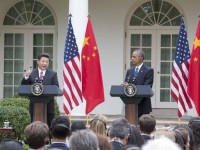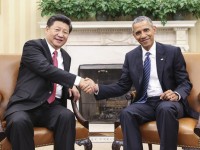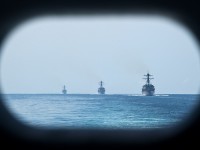Oct 24, 2015
The U.S. Navy's top commander in the Pacific says it's up to policymakers in Washington whether his sailors patrol within 12 nautical miles of newly constructed islands claimed by China in the South China Sea. Pacific Fleet Commander Adm. Scott Swift spoke during an interview Thursday amid tensions over Beijing's territorial claims in the South China Sea and reports the U.S. will sail near the disputed islands to challenge those claims.
Oct 23, 2015
Relations between the Chinese and U.S. navies are their "best in history" and exchanges between the two will become more systematic in the future, China's military on Friday cited the country's naval chief as telling visiting U.S. officers. The comments by navy chief Wu Shengli come as Washington considers conducting freedom-of-navigation operations within 12 nautical miles of artificial islands China has built in the disputed South China Sea, without saying when it would do so. Such a move would likely infuriate Beijing.
Oct 22, 2015
China hosted a visit this week to its sole aircraft carrier by senior U.S. Navy officers amid tensions over reported plans by Washington to challenge Beijing's territorial claims in the South China Sea.

Ted Galen Carpenter, Senior Fellow, Randolph Bourne Institute
Oct 05, 2015
Given the rising hostility toward China in some American political circles, and the growing calls for a confrontational policy, the modest achievements made in the realms of cyber, the South China Sea, and North Korea are commendable.

Stephen Harner, Former US State Department Official
Oct 05, 2015
Following President Xi’s recent visit to the U.S., Xi’s concept of “a new model of great power relations” seems to be back on the China-U.S. agenda. Originally pushed by Xi and now being reconsidered by Obama, this concept suggests a major turning point for both countries.
Minxin Pei, Tom and Margot Pritzker ’72 Professor of Government , Claremont McKenna College
Sep 22, 2015
As Chinese President Xi Jinping begins his trip to the United States in Seattle, home to many of the world’s leading technology firms, most observers are looking ahead to his subsequent meeting with President Barack Obama. Can the summit reverse the downward spiral in US-China relations that began with Xi’s accession to power in 2013?

Zhai Kun, Professor at School of International Studies; Deputy Director of Institute of Area Studies, Peking University
Sep 20, 2015
There is no lack of communication between Washington and Beijing on the South China Sea issue, which will likely be on the agenda of the Xi-Obama meeting in September. If China’s “dual-track” approach to the issue can be wed to the new model of major-country relationship between China and the United States, they can reach some accommodation and reduce the chance of a showdown.
Ma Shikun, Senior Journalist, the People’s Daily
Sep 07, 2015
Apart from meeting China’s own defense needs, the activity is also based on a 1987 request from the United Nations. By constructing civilian facilities on the islands and reefs in a transparent way, China is contributing to navigational safety and raising the level of maritime cooperation in the region.
Lucio Blanco Pitlo III, President of Philippine Association for Chinese Studies, and Research Fellow at Asia-Pacific Pathways to Progress Foundation
Aug 31, 2015
Lucio Blanco Pitlo III analyzes the historical and political contexts that have increased the strategic importance of the South China Sea (SCS) for the Philippines and China. Despite the obvious clashes in the SCS positions of the two countries, avenues for collaboration remain open.
Zhou Bo, Senior Fellow, Center for International Security and Strategy, Tsinghua University
Aug 20, 2015
Beyond search-and-rescue cooperation and crisis management, creating hotlines between China and the 10 ASEAN countries would carry a no less important symbolism: the consensus that the South China Sea issue is not an issue between them as a whole.
Back to Top

- China-US Focus builds trust and understanding between the U.S. and China through open dialogue among thought leaders.
- Our Offerings
- Topics
- Videos
- Podcasts
- Columnists
- Research Reports
- Focus Digest
- Stay Connected
-
Thanks for signing up!
- Get the latest stories from China-US Focus weekly.